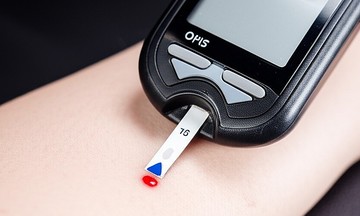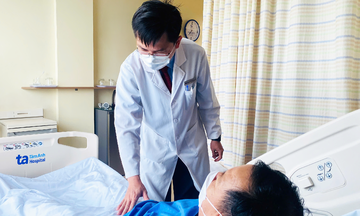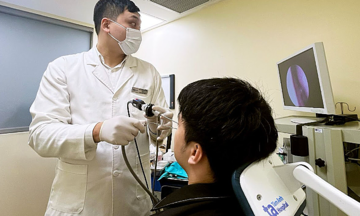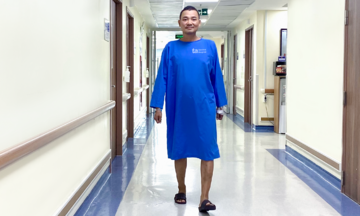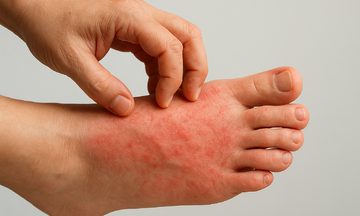Nine years ago, Hung received liquid silicon injections (a form of filler long since banned) at a cosmetic clinic to enhance his nose, fill his hollow cheeks, and adjust his laugh lines for perceived good fortune. Since then, he has experienced allergic reactions to various substances, including toothpaste, scented or foaming products, perfume, cosmetics, scents in supermarkets and elevators, and even the smell of people nearby. He has been hospitalized multiple times for anaphylactic shock.
Associate Professor Doctor Hoang Thi Lam, Head of the Clinical Immunology Department at Tam Anh General Hospital in Ho Chi Minh City, believes the silicon triggered changes in Hung's immune response, leading to these allergic reactions. Examinations revealed that the silicon injected under Hung's skin did not dissolve, but instead dispersed and formed clumps, becoming foreign bodies that reacted with his system, causing inflammation in his nose and cheeks.
Silicon, a non-biodegradable polymer, is recognized by the body as a foreign substance, triggering a chronic inflammatory response around the injection site. Dr. Lam explained that this long-term inflammation can lead to a loss of immune control. Consequently, the patient may develop unusual sensitivities to antibiotics, anti-inflammatory drugs, and anesthesia, resulting in dangerous complications such as anaphylaxis and embolism, which restricts blood flow to the injected area.
 |
A doctor examines Hung for allergies. Photo: *Tam Anh General Hospital* |
For years, Hung has relied on corticosteroid-based antihistamines, which have led to side effects including Cushing's syndrome and adrenal insufficiency, as well as diabetes. "Corticosteroids can be life-saving in acute allergic reactions, but they shouldn't be used long-term or without a doctor's prescription," said Dr. Lam.
After consultations, doctors determined that surgically removing the silicon clumps was the best way to address the root cause of the allergies. However, due to the long-standing nature of the clumps and Hung's underlying conditions of adrenal insufficiency and diabetes, surgery posed significant risks. Hung decided against the procedure, and doctors focused on managing his allergies and underlying conditions to prevent further complications.
Because Hung is allergic to many medications, doctors had to choose less effective drugs, resulting in a longer, more expensive treatment plan with more side effects. Dr. Lam prescribed omalizumab, a biological therapy, to manage Hung's allergies. The treatment involves 6 to 8 injections, administered monthly, to control symptoms without further damaging his adrenal glands. He requires a 6-month treatment course with 6 injections. The duration of treatment will be adjusted based on his response.
After 4 injections and adherence to the prescribed treatment plan, Hung's allergic reactions have decreased by 70%. He can now tolerate some antibiotics, and his sensitivity to scents has also significantly improved. While he still experiences hives and chemical sensitivities, the reactions are less severe.
Doctors advise that persistent or recurring allergic symptoms like itching, hives, runny nose, persistent cough, shortness of breath, or swelling of the lips or eyelids should not be ignored or self-treated. These symptoms could indicate an underlying immune disorder or chronic allergies to various allergens such as food, pollen, dust mites, mold, artificial fragrances, medications, or weather changes. Individuals experiencing these symptoms should consult a clinical immunologist, undergo allergy testing, and have their IgE levels checked for early diagnosis and to prevent the progression to severe or chronic allergies, which are more challenging to treat.
Minh Huong
*The patient's name has been changed.



